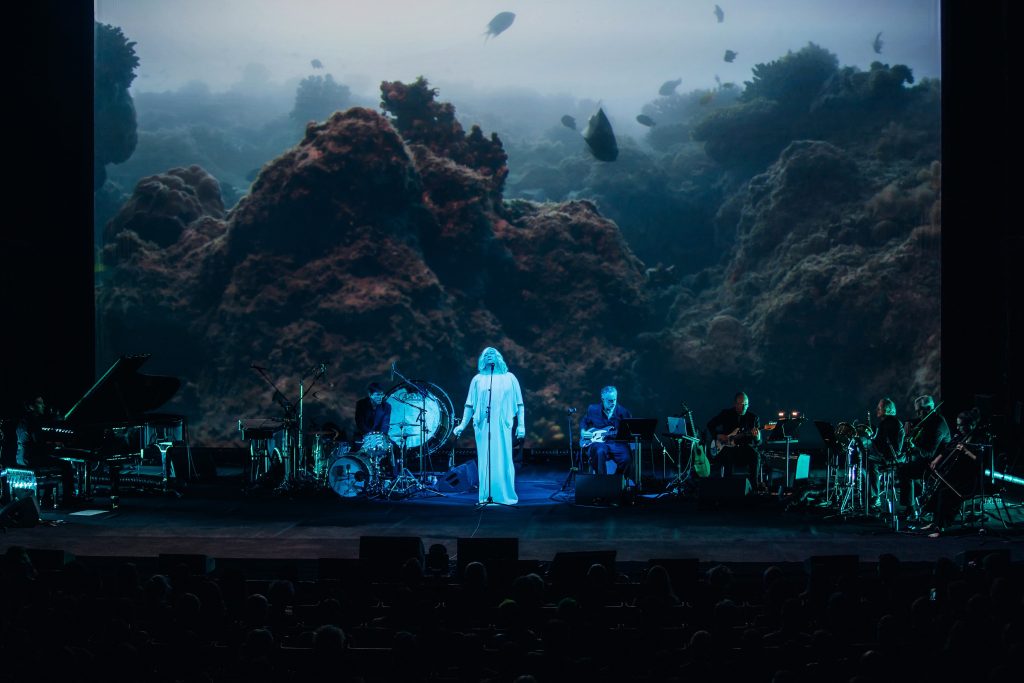Anohni and the Poetics of Soft Resistance
Anohni’s voice isn’t just a musical expression—it’s a calling, an intuition, a space where emotion and ideology collide. Her process is rooted in instinct. She’s not interested in hope, but in truth. In a world where activism is often reduced to an Instagram story, Anohni reminds us of the transformative power of creation. This conversation isn’t about getting lost in her universe—it’s about learning to see more clearly within our own.
When you write music, do the words come first or does the sound guide the story? What does your writing process look like?
I usually write the words separately. It really depends. From my last record I wrote a lot of the music with a collaborator, the producer Jimmy Hogarth. his style of playing guitar really inspired me and we move towards a soulful sound. The words are important to me and usually reflect ideas that I have been mulling over for a long time.
“ My work is a reflection of my life, my perception of the world around me, my feelings and intuitions about what is really happening, and I don’t really separate these different streams.”
– Anohni

Themes like nature, death, identity, and justice have always been present in your work. How would you describe your long-standing relationship with these motifs?
My work is a reflection of my life, my perception of the world around me, my feelings and intuitions about what is really happening, and I don’t really separate these different streams. I’m an intuitive person. I find value in focusing on and raising up the things that I care most about. I am lucky to have the opportunity to do that, as I know that many people in this world have not been afforded much time to spend on the things or with the people that they care the most about so being an artist is really a privilege.
Where do you think activism and art stand in today’s music industry? Is the relationship still sincere, or has it become a marketing tool?
I think it really depends on what country or part of the world you’re living in. There isn’t much in the way of activism in a lot of western pop music. On the other hand, Turkey has a very powerful history of traditional music that is has very compelling and revolutionary aspects. I love Selda Bağcan. Black Americans have a long and elegant record of revolutionary music composition. And things are changing all the time. Also, I am sure that there is tons of music from other parts of the world that is riveting and engaging, but I don’t know it. I wish I had more lives.
”I want to embrace my life and the present moment for what it is, and look at it squarely, and try to feel what’s really happening.”
-Anohni
There’s a powerful melancholy in your music, but also a deep sense of hope. How do you navigate that emotional balance.
I’m not really interested in hope. I find it kind of irrelevant as an idea. What I care about is the present, and materiality, and creativity and color and light and life. Hope seems like an Abrahamic concept to me, an idea about a patriarchal and ordered sense of heaven, a guarantee waiting in the distant future, that justifies enduring or engaging with the present. But lots of Christians hope they go to heaven. Lots of right wing people feel hope. I want to embrace my life and the present moment for what it is, and look at it squarely, and try to feel what’s really happening.
Do you believe art has a responsibility to change the world or is that more of a byproduct?
I believe what Nina Simone said; an artist should reflect the times in which they are living, you can do that either as a source of insight or as a symptom of unwellness.
What question you find yourself returning to these days?
What will it feel like in 500 years? One day will we be looking out of the eyes of the animals that we subject to so much torture and stress?
In your work how do you see the relationship between healing and pain? Do you believe art can transform trauma?
Yes, art can transform trauma. Creativity is like a dreaming state it is medicinal And it is our chemical in its ability to release unwellness, trauma, and tension. It is a dreaming ground.

Do you have any rituals or habits before taking the stage?
I asked the goddess to do whatever she wants with me. Take my body and do whatever you want with it. Invite ghosts to take a dance.
When do you feel most yourself?
When I’m asleep.
What’s something you wish more people knew about you beyond the music.
I don’t exist beyond the music.